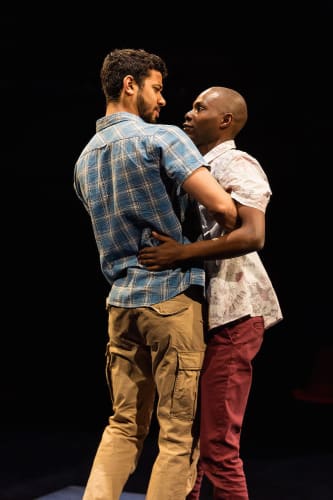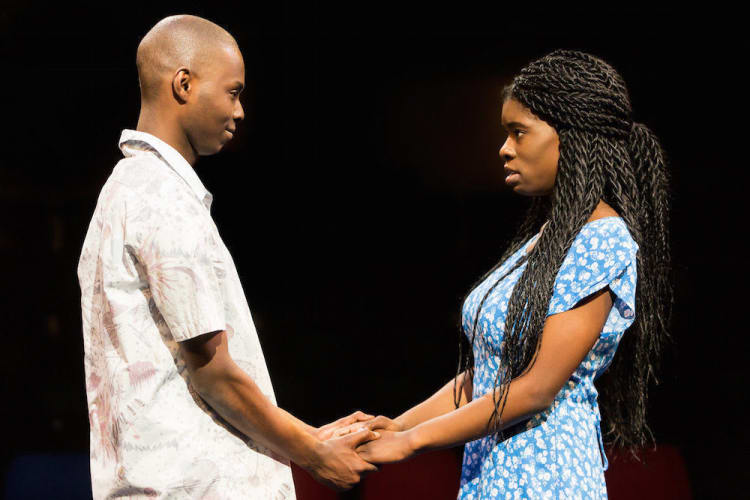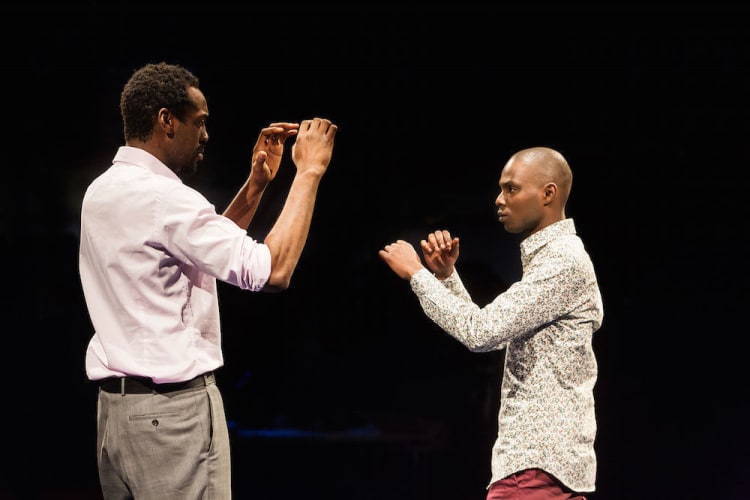In a theatre surrounded by Simon Annand's wonderful photographs of playwrights, Bruntwood Judges' Prize winner Chris Urch's Rolling Stone makes its debut on the main stage of the Royal Exchange in rep with Anna Karenina, and sharing some of its cast.
The play begins with a pull-back-and-reveal. All we see is two men, one black and one white, talking on a sparse set. Their accents and conversation reveal one to be an African student, Dembe (Fiston Barek), and the other a mixed-race doctor from Northern Ireland, Sam (Robert Gilbert), then we learn that they are on a date.
The date becomes a relationship, but this is Uganda, where being gay is not just illegal but also the excuse for lynchings and murders, encouraged by the tabloid newspaper The Rolling Stone, which publishes pictures of those suspected of being homosexual together with their names and addresses.
The excuse for the extreme homophobia is a deep-seated religious fervour based on the American Evangelist Church's teachings in colonial times. To make things worse, Dembe is from a "good Christian family" and his older brother Joe (Sule Rimi) has just become pastor of the local church, following in their late father's footsteps.
Despite the small cast and the sparse sets, this play belongs in the main house as it has an epic feel that would have been squashed out of it in the Studio, where main prize winner Anna Jordan's Yen premièred earlier in the year. It comes across like an African Arthur Miller, not just in the Crucible-like atmosphere of an accusation alone being as good as a conviction but in the way an intense family drama resonates politically across a whole society.
However the roots in the family's past are not drawn as strongly as in Miller's plays. While the recently-deceased father is often mentioned, the events in the play barely link to him at all, and so this is less a personal family tragedy and more a story of people who are helpless in a political situation.
Urch's writing touches on several other issues, which he doesn't have the space to explore fully. So while not having enough money to educate both Dembe and his more studious twin sister Wummie (Faith Omole) and the faith healing of Naome (Ony Uhiara), daughter of fiercely protective Mama (Donna Berlin), who lost the ability to speak some months ago, certainly work as part of the canvas on which the play is drawn and feed into the main story, one can't help feeling that they deserve plays of their own.
However there are some very strong scenes in this play with some great writing that really draws you into this world and makes you care for the characters, even those who are preaching hatred. The ending is inconclusive in a slightly disappointing rather than an intriguing way, but the build-up to it is quite compelling.
Director Ellen McDougall has created a tightly-paced production with impressive performances from all of her cast and a refreshingly simple setting from designer Joanna Scotcher.
The Judges' Prizes from Bruntwood usually throw up some very interesting plays, often more interesting than the main winners, and in this case they have picked a worthy winner from a writer who is certainly one to watch for the future.


